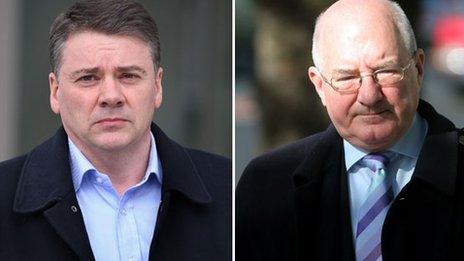Anglo trial: Pat Whelan and Willie McAteer avoid prison
- Published

Pat Whelan and William McAteer were found guilty on 10 counts but walked free from court after a judge ruled they should serve community service instead of prison terms
Two former Anglo Irish Bank chiefs convicted of making loans to illegally prop up the bank's share price will not go to jail, a judge has ruled.
Pat Whelan, 52, former head of lending in Ireland and Willie McAteer, 63, the bank's former finance director were found guilty earlier this month.
The pair have walked from court in Dublin after the judge ruled they should serve community service.
The judge said jail would be unjust as they believed they had acted lawfully.
Anglo Irish Bank collapsed in 2009, costing Irish taxpayers more than 30bn euros (£25bn).
Both men had denied the charges against them during their trial at Dublin Criminal Court.
Sean FitzPatrick, 65, the bank's former chairman was cleared of illegally supporting the bank's share price.
Mr FitzPatrick, 65, held the top job in 2008 when the bank made loans to 10 wealthy customers who used the money to buy the bank's shares.
The jury found that Mr FitzPatrick's behaviour had not been illegal.
However, it convicted Whelan and McAteer who were more closely involved in arranging the loans.
The criminal case concerned a transaction involving the country's then richest man, Seán Quinn.
He had taken a complicated financial bet that meant he, in effect, controlled 25% of the bank's shares.
But Mr Quinn's bet had gone horrendously wrong.
There was the prospect that he would have to dump his huge shareholding on the market and that would cause the bank's share price to collapse.
The bank's response was to get 10 of its wealthiest customers to buy the Quinn shares.
The bank lent the investors the money to buy the shares - and did so on favourable terms.
Loans were also provided to other members of the Quinn family to take up some of the shares.
Earlier this month, the jury found that the loans made to the Quinn family were not illegal.
Those loans were made on less favourable terms than the deal with the 10 other investors.
Whelan, of Malahide, County Dublin, and McAteer of Rathgar, Dublin, were cleared on those counts.
At the time, the deal had the desired effect and helped stabilise the bank.
However, the deal was a breach of company law which prevents a firm lending to a customer with the intention of affecting its own share price.
The judge directed the jury that, to convict, they must be satisfied that the loans had not been made in the ordinary course of the bank's business, that each of the defendants knew about the scheme and did not take steps to stop it.
Mr FitzPatrick's barrister had argued that his client's knowledge of the scheme was limited and that he was out of the country at the time the deal took place.
- Published17 April 2014
- Published17 April 2014
- Published15 April 2014
- Published17 April 2014
- Published17 April 2014
- Published16 April 2014
- Published14 April 2014